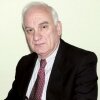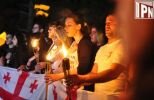Putin & homosexuality, Putin & the church
01 August, 2013
 The last several weeks have seen two important developments in Russian politics. The first involves the Kremlins position on homosexuality. The second involves Putin’s relationship with the church and how he is using it to assist his imperial project.
The last several weeks have seen two important developments in Russian politics. The first involves the Kremlins position on homosexuality. The second involves Putin’s relationship with the church and how he is using it to assist his imperial project.Recently Russia has passed several laws connected homosexuality, most importantly banning “gay propaganda” with no clear definition. None of them address a real problem but allow the authorities to keep this issue alive via its control of the police and courts. The kremlin has realized that homosexuality is a powerful and therefore useful wedge issue. A wedge issue is one that politicians use in order to try to make people choose a side often where no sides exist or need to exist. Homosexuality is no more an important an issue in Russia than anywhere but it is an issue that a two small important groups care about a great deal, the first group is gay people themselves and the second group is those who fear and hate gay people.
At the same time Putin has gradually in his most recent term positioned himself closer and closer to the church and increasingly coordinates with it politically. He is faced with a dilemma. He wants what is known in Russia as its “near abroad” to be vassal states but Russia has so little to offer its fuel and raw materials. It isn’t very important in the global trade system compared to the US, China or the EU. Its international role is as a spoiler; Russia is dealt with as a necessary chore rather than as a partner. So how can Putin encourage the people of the near abroad to feel any kinship for Russia?
The Orthodox church fits the bill perfectly. Most of at least the western part of Russia’s near abroad is in fact Orthodox. This was highlighted on Putin’s visit to Ukraine for the 1025th anniversary of what has become known as “the conversion of the Rus” when Prince Vladimir of Kiev’s converted to Christianity and baptized his subjects in 988. He spoke at the holy site, the Monastery of the Caves in Kiev and said, “We are all spiritual heirs of what happened here 1,025 years ago and in this sense we are, without a doubt, one people.” The event was covered lavishly by Russian media.
Recently on Russian State Television there was a program called “The Second Baptism of Rus,”, in it Putin, said Prince Vladimir’s choice of religion, “built a centralized Russian state,” an importnat priority of his. The former KGB man also fondly relates the story of his mother having him baptized in secret because of Soviet repression of the church. In fact he bizarrely says Communism is “just a simplified version of the religious principles shared by practically all the world’s traditional religions” and said that today’s turn to religion was “a spontaneous movement from the people themselves to turn back to their roots” in response to the ideological vacuum after the Soviet Union’s collapse in 1991. The New York Times has reported on this, but it has been much less covered outside of the very heavy Russian media coverage, and much less in Ukrainian media than in Russian language media in Ukraine. Of course the real unmentioned reason for Putins visit to Kiev is that Ukraine intends to sign an association agreement with the EU in November in Vilnius.
Also quoted by the New York Times, Russian Patriarch Kirill I has said on his official web site about homosexuality, “This is a very dangerous apocalyptic symptom, and we must do everything so that sin is never validated by the laws of the state in the lands of Holy Rus, because this would mean that the people are starting on the path of self-destruction,” Before this he has said that such “blasphemous laws” could prove as dangerous to believers as the executioners of the Great Terror during the government of Stalin. Difficult to imagine a more divisive way of expressing fear of homosexuality.
Secular western democracies don’t really care that much about gayness as an issue or protecting gays from unfair abuse. But they do take tolerance in general very seriously. And intolerance always begins with one group first as from the famous quote by Martin Niem?ller famous German pastor who after being an outspoken public critic of Adolf Hitler spent the last seven years of Nazi rule in concentration camps. First they came for the Socialists, and I did not speak out - because I was not a Socialist. Then they came for the Trade Unionists, and I did not speak out - because I was not a Trade Unionist. Then they came for the Jews, and I did not speak out - because I was not a Jew. Then they came for me - and there was no one left to speak for me.
So if at some point the church or those who appoint themselves as spokespeople of the church begin to attack the rights of some - any - particular group and say that they are dangerous and their rights should be restricted; the Roma, or Muslims, or people with dark skin, or Armenians, or tall people, or women or anybody else, then people who feel strongly about tolerance will always defend the rights of that group on principal.
And many people feel strongly that homosexuality is a sin and is a problem and it is easy to tie that together with traditional values. This can be done anywhere in the world and in fact is. Recently Robert Mugabe, the dictator of Zimbabwe who tries to position himself as the anti-colonial champion of Africa, said that gay men should be beheaded in language not so different from that used in Russia. He has said consistently that homosexuality is a European plot that must be resisted by those loyal to African traditions. This is a universal wedge issue.
There are dictatorships like Zimbabwe, North Korea, and Turkmenistan that don’t have much interest in integrating with the West in any way. They are poor isolated countries whose citizens leave if they can. But Russia wants to have it both ways, at the moment it finds using intolerance of homosexuality wrapped in a Christian disguise a convenient way to further its colonial ambitions, to try to bring its reluctant neighbors close, and to insult European values indirectly. The difficulty it has is that at the same time it needs Europe and wants to be able to be a part of the international system.
Russia’s international ambitions are now symbolized by the Sochi Olympics. There are hundreds of gay athletes who intent to participate in those Olympic games and their families, and many thousands of fans. If some of them are interviewed on television in Sochi and say they are gay, they could be convicted of “gay propaganda” (whatever that is). So can a country even host the Olympic games if it is passing laws like that? These are questions that many gay athletes are asking the International Olympic Committee right now and there is discussion of a boycott. So right now Russia is allowed to have it both ways to be both isolated and backwards but also to participate in the international system, but at some point it will have to choose.
SEE GEORGIAN VERSION













































